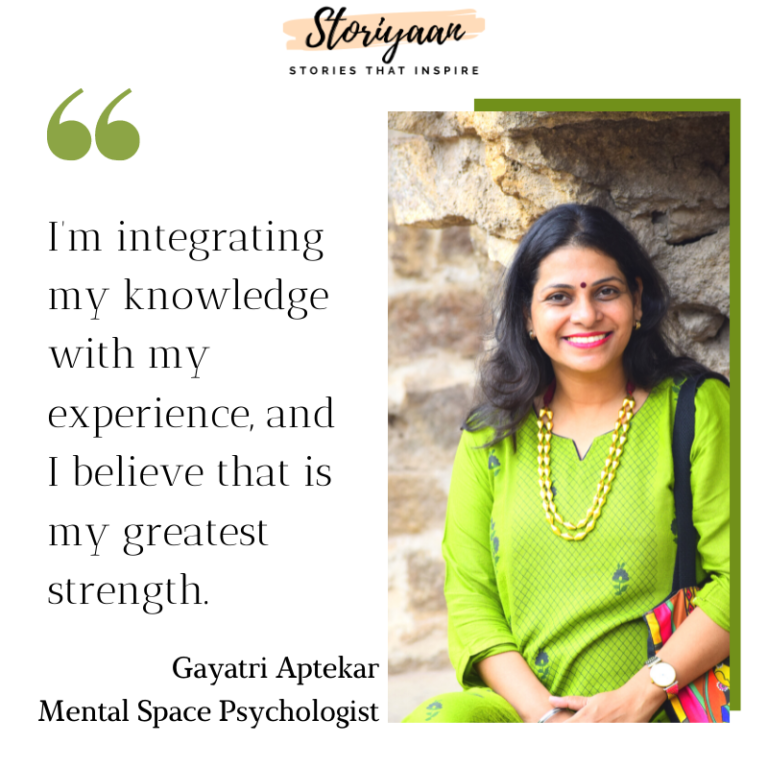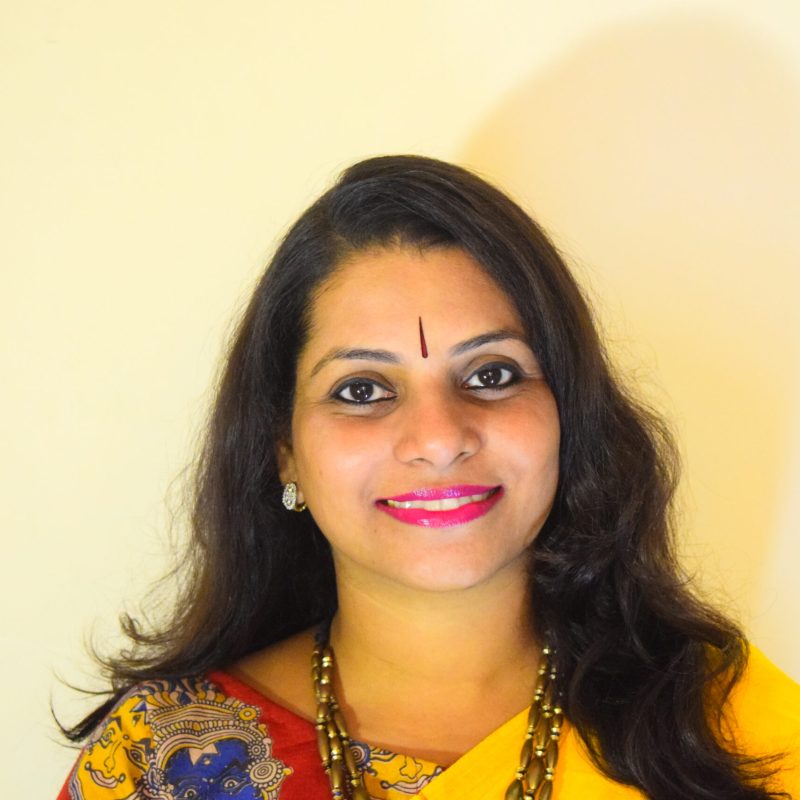Gayatri Aptekar
Gayatri Aptekar is a certified therapist. Learning from her past experiences, she realized the importance of mental health and started with the journey to help others get out of the deep and dark trench of mental illness. Gayatri brings her strength from her experience and empathy and tries to help out her patients in the best possible way.
“Patience and listening is the key,” says Gayatri in conversation with Storiyaan, where she also opens up about various aspects of mental health and how small neglected issues can lead to major mental health problems. Have look at this interview to know more about Gayatri and her journey of helping people heal.

Interview
Questions and answers
Can you tell us about the turning point that began your journey with psychology and what kind of an adventure has it been so far?
Watching my daughter grow up was the turning point for me. Due to traumatic childhood experiences, I became emotionally unavailable to my daughter and I could see that reflecting on her. My medications weren’t very helpful and I was keen to understand what was happening in my mind. It was because of my daughter that I got acquainted with my mental state and started this fascinating journey.
Which of the strengths that you bring to the table do you think is most important in your job?
According to me, my strength is my experience. Growing up, I lived in an abusive environment and all the traumatic experiences have been decked up in my mind. So, while listening to other people I can provide them with a safe space full of empathy and understanding. I’m integrating my knowledge with my experience, and I believe that is my greatest strength.
As an accomplished psychologist, what advice would you offer an individual entering the field of psychology concerning the role of social media?
You should know why you are getting into this field and must be sure about it. It is a very sensitive field as you are dealing with the mind, heart, and functioning of the brain to comprehend someone’s emotions. Listening to others’ problems can be draining at times as well. Money and abundance will flow. Focus on your intention to do it and keep yourself open to learning.
What influence have reading/didactic experiences had on the way you think about diverse populations?
This field is not only about reading but also about reflecting on the words and using them to integrate that knowledge into your life. There will be a lot of thought processes that will emerge and will make you realize what this society tames and how many atrocities exist in it. Reading and reflecting have helped me connect with every age group as it makes your mind and empathy flexible.
You often post videos that capture the essence of the human mind as well as the existential insecurities of a person but in a fun and relatable manner. What is the source of inspiration for such content and what is your strategy to remain relevant?
I specialize in working with emotions and I wanted to talk about that. So, I figured that reels were getting more attention on Instagram and I decided to work on it so that people can get information and connect to it.
As a therapist, you get the closest to the “inner demons”, as said in popular culture, in your clients’ heads. How does that affect you personally and does that make you reflect upon yourself as well?
I wouldn’t call them inner demons but unhealthy coping mechanisms. We always need someone to guide us to process our thoughts and emotions. Managing such emotions is something no one can teach us and our brain starts to figure out a way that gives birth to such mechanisms so when I sit with a client, I give them insights and listening is the key. It’s a relationship through which you are growing as well.
“Depression and Anxiety are a problem among the millennial and not the generation before that” – a common notion among people. How, in your opinion, can this mindset be changed to encourage more people to focus on their mental health?
Small moments of frustration and irritation are seldom paid enough attention and they keep on getting piled up in the back of your mind. Over time, it builds up and you either explode or it has a worse effect on your mental health. It also disrupts your sleep and dietary habits which ultimately leads to clinical depression and anxiety. Everyone should pay attention to their mental health at all times.
A lot of people feel therapy to be way expensive and therefore elude it even though they are in great need of it. What would be your advice to them?
Mental health should be a basic necessity which you should incorporate in your life and prioritize over what you want. This is more of an investment in yourself and keeping a healthy heart and a brain. When it comes to people who are financially challenged, there are NGOs providing free services and therapists offering a sliding scale. Reach out. There is help available.
What would be your advice to someone who has lost faith in therapy as a result of a wrong treatment that might have aggravated his/her problem?
I would want to say that finding a therapist is a time fest. There are different types of therapy according to the expertise of the therapist. Do your research. If a therapy went wrong, and you don’t feel right, I would suggest taking some time off and begin your research again, talk to people, consult, speak. Just speak your mind. Give yourself the gap and the space you need.
Which aspect of your job do you find to be the most soul-satisfactory and how does it motivate you?
I don’t feel what I do is a job but this is who I am and I’m very satisfied and content with it. It’s a very grounding experience that makes me very happy and when I see the power of the human brain and me being able to help, I enjoy all aspects of it.
“Even therapists need therapy”. What is your opinion on this and how do you help yourself when you find yourself in need of talking to someone?
My social media account has these emotions decked up on my profile because I feel everything that a person should feel and I cry, I break down, but the thing is I know how to channelize my feelings. I become my therapist and take as much time as I need to take, give myself a break. Also, I have a community where I reach out and I get the help that I need. Going back to what I learned also helps.
Quick 5
a. Describe therapy in a word – A mirror to your inner world.
b. Music to you is? – Earlier, music was anything but now music is very conscious to me and I’m very conscious about the kind of music I listen to.
c. Life is incomplete without? – I think life is wholesome and complete.
d. Your happy place? – The time with my client.
e. When not working, you are mostly… – I’m cooking. I’m always working, something or the other, just lazing and living my life.

